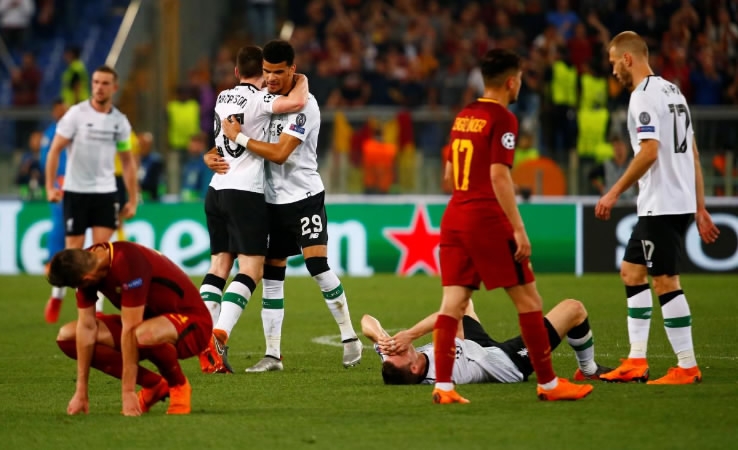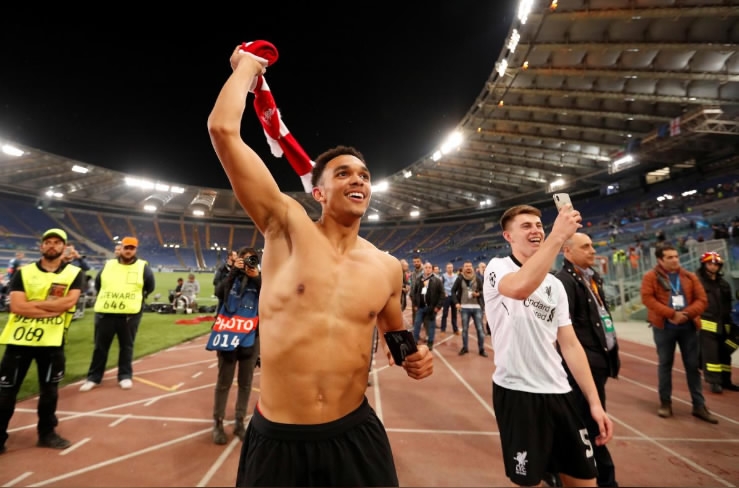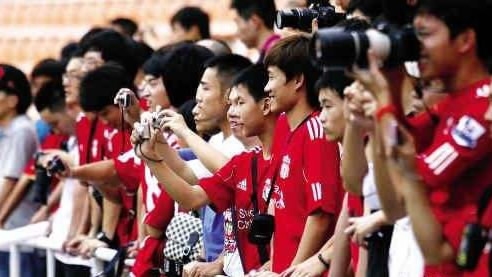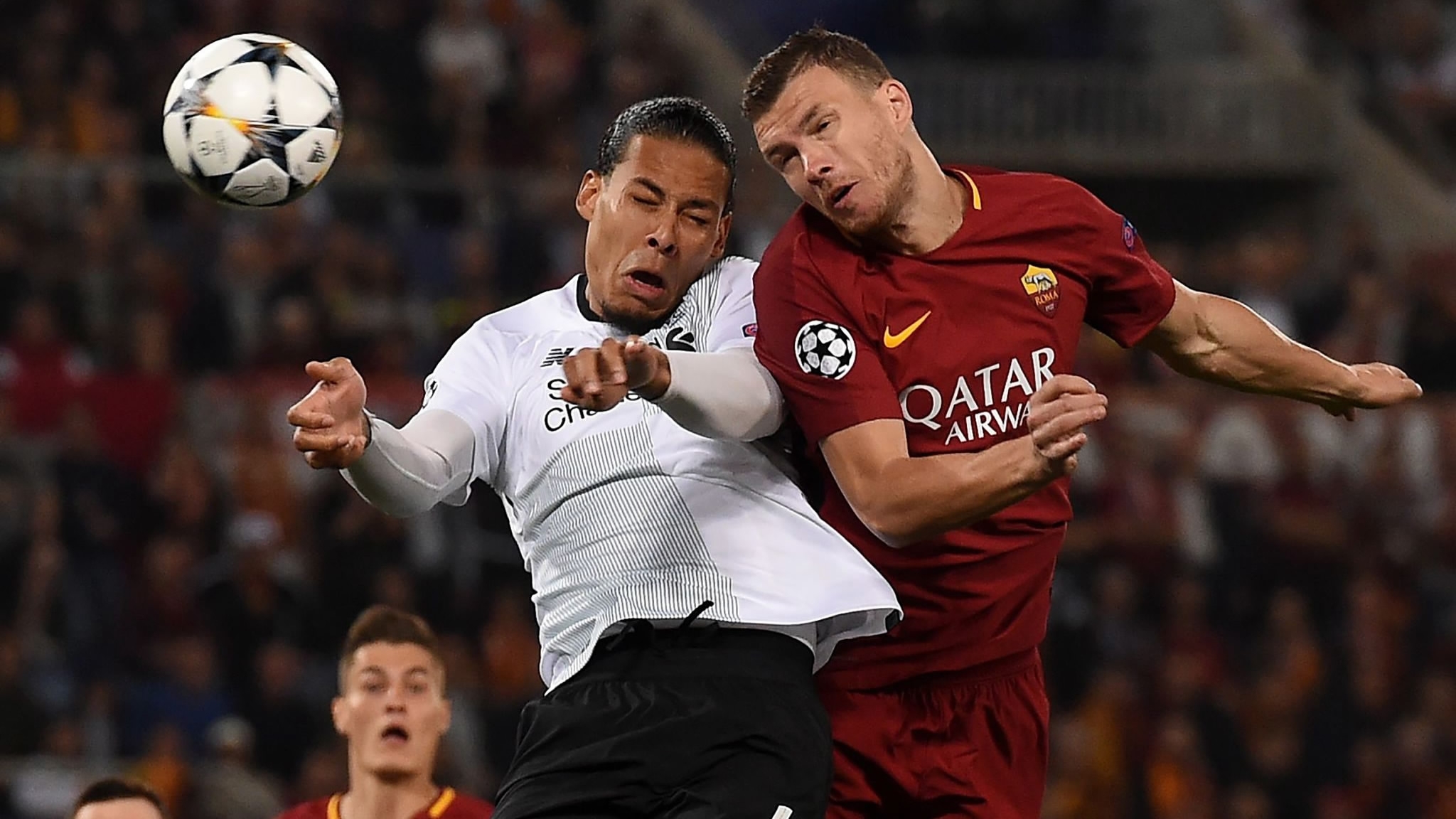After a mouthwatering semi-final rooted in football rivalry, Liverpool’s UEFA Champions League meeting with Roma evoked memories of the 1984 European Cup final between the sides in the Italian capital – where Joe Fagan’s players took home a 4-2 victory on penalties after a 1-1 draw.
Etched in history, the game that saw the iconic penalty shootout duel, Bruce Grobbelaar’s "spaghetti legs" stance, and Alan Kennedy’s spot kick immortalized in footballing legend loomed over the two clubs’ second leg meeting at the Stadio Olimpico on May 3, in a semi-final that has undoubtedly been shaped by destiny.
Not one to look back, Liverpool manager Jurgen Klopp rarely dwells on the club’s illustrious past, which includes two out of its five European Cup final victories taking place at the Giallorossi’s home ground. However, he might have to make an exception, as 34 years later the Reds relived history, beating Roma 6-7 on aggregate to qualify for their first Champions League final in 11 years.
One step closer to title glory
After being humbled 5-2 at Anfield, Roma needed to repeat their 3-0 second-leg victory over Barcelona in the quarterfinals to overturn a three-goal deficit for the second time this season in the league. But, despite Radja Nainggolan’s two goals in the last five minutes, including a stoppage-time penalty that meant Liverpool’s aggregate lead was down to one, the gap proved too much to overcome with Roma manager Eusebio Di Francesco’s men taking home a final score of 4-2.

Champions League Semi Final Second Leg – AS Roma v Liverpool – Stadio Olimpico, Rome, Italy, May 2, 2018. Liverpool's Dominic Solanke and Andrew Robertson celebrate as Roma players look dejected after the match. /Reuters Photo
Champions League Semi Final Second Leg – AS Roma v Liverpool – Stadio Olimpico, Rome, Italy, May 2, 2018. Liverpool's Dominic Solanke and Andrew Robertson celebrate as Roma players look dejected after the match. /Reuters Photo
Although Roma – who had not conceded a single home goal in this competition – put up a good fight, it wasn’t enough to combat the Red’s prolific attack as Sadio Mane’s opener nine minutes in, eased early nerves. Even when James Milner’s unfortunate own goal offered Roma a strand of hope, Georginio Wijnaldum’s header made it 2-1, and secured the record for the highest scoring team in the competition’s history, previously held by the 1999-2000 Barcelona side.
Klopp’s men, who have accumulated 46 goals, including qualifiers in this competition, refused to sit back. Undeterred by Edin Dzeko’s second-half goal and a double from Radja Nainggolan, the visitors saw out the highest-scoring Champions League semi-final to advance to the next stage of the tournament for the first time since 2007.
Eye on the prize
Having defeated Premier League champions Manchester City 5-1 on aggregate at the Etihad Stadium in the last-eight tie and now the three-time Serie A winners Roma, the weight of the club’s European past success may be lifting with this season’s run to the finals against Real Madrid signalling the start of a new golden era under Klopp.

Champions League Semi Final Second Leg - AS Roma v Liverpool - Stadio Olimpico, Rome, Italy - May 2, 2018 Liverpool's Trent Alexander-Arnold and Ben Woodburn celebrate after the match Action Images via Reuters
Champions League Semi Final Second Leg - AS Roma v Liverpool - Stadio Olimpico, Rome, Italy - May 2, 2018 Liverpool's Trent Alexander-Arnold and Ben Woodburn celebrate after the match Action Images via Reuters
And the manager’s gaze is fixed firmly on adding a sixth Cup to Anfield’s trophy cabinet: “They don’t hang silver medals at Melwood. Going to a final is really nice, but winning is even nicer. I think 80 percent of the team of Real Madrid played all these finals. They are four times in the last five years and still together. They are experienced. We are not, but we will be really on fire.”
Despite their rich heritage in the competition, Liverpool – who last won the Champions League in 2005 – have not been in the last two of the tournament for a decade. In a season that has so far bore witness to Roma knocking Barcelona out of the competition with an incredible comeback at home, Juventus very nearly doing the same in the Bernabeu only to lose at the last minute, and arguably the two top Premier League clubs likewise being thwarted in the quarter-finals. This year’s unpredictability has not only stolen headlines, but also sparked rejuvenated interest internationally.
China’s football fever
China is fast becoming the number one market for football fan growth, revenue opportunities and untapped sponsorship, spurred by President Xi Jinping's football reform. European football is widely followed in Asia, and while there's no denying that Liverpool's success has caught the eye of many fans globally, how popular is the Premier League club in China?
Launched on February 14, 2014, Liverpool set up its official Chinese website that has since become a gathering place for supporters. While in 2011, the Reds became the first European football club to enter the Chinese Internet market by opening an official Sina Weibo account. The English outlet now also has Tencent Youku and Wechat profiles, further attracting a wider fan base.

Robbie Fowler, the Liverpool and Premier League legend is seen here teaching Chinese kids to play football. /Photo via Sina Weibo
Robbie Fowler, the Liverpool and Premier League legend is seen here teaching Chinese kids to play football. /Photo via Sina Weibo
At present, over 2.5 million fans in China have participated across its official social networking platforms with the club netting 2.42 million followers on Sina Weibo. According to independent survey data conducted by Repucom for Premier League teams, Liverpool has 170 million potential fans in China.
Although some clubs are more popular on Chinese social media platforms than others, a
BBC survey earlier this year revealed Liverpool to be in the top five. The club took fifth place as the most followed football team in the country, along with Manchester United with the top spot, Spanish giants Real Madrid (second), Germany's Bayern Munich (third) and Arsenal (fourth).
Identifying with European clubs
A question often asked is how these supporters can relate to clubs that are thousands of miles away? All of the traditional ideas of inheriting a club being linked to geographical belonging are lost, but the key feature of being a fan, the emotional engagement, is still apparent.
A domestic report released last year, based on 62,164 valid questionnaires, revealed that more than three-fourths of China’s Liverpool fans have watched the games for more than five years.

Hundreds of passionate Chinese supporters welcome Liverpool. /Photo via xkb.com
Hundreds of passionate Chinese supporters welcome Liverpool. /Photo via xkb.com
With European matches commencing in the early hours of the morning due to the time difference, Chinese football fanatics often have to hire a venue to make sure they have somewhere to watch the game. However, despite the Champions League final taking place at 2.45 a.m. BJT on Sunday May 27, there won’t be a shortage of Chinese supporters awake in the early hours of the morning as millions of Liverpool fans gear up their biggest game of the season.






